Text
11月8日。
食べ物!
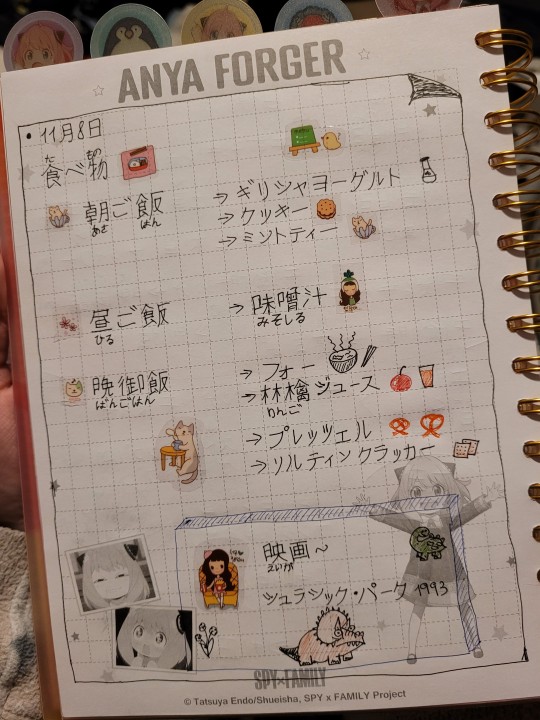
#日本語の勉強#日本語#japanese practice#japanese language#japanese notes#language study#bujo#journaling#bullet journal
22 notes
·
View notes
Text

日本語 practice 11月7日。
Some of my daily routines.
13 notes
·
View notes
Text
Japanese Reading Resources for Absolute Beginners
A question I encounter often is "How much Japanese should I study before I can begin reading in Japanese?"
From my experience as a learner and reader myself and from managing a Japanese book club for other learners I can honestly say that you can start way earlier than you probably think!
There are many resources that only require knowing hiragana. Those texts usually teach vocabulary through pictures and only use basic grammar.
Some are even simpler than that: The Japan Foundation's Hiragana Books are great for those, who are still remembering hiragana characters. Every short book introduces only 1-2 new characters, so it's a great reading exercise for those who've just started.
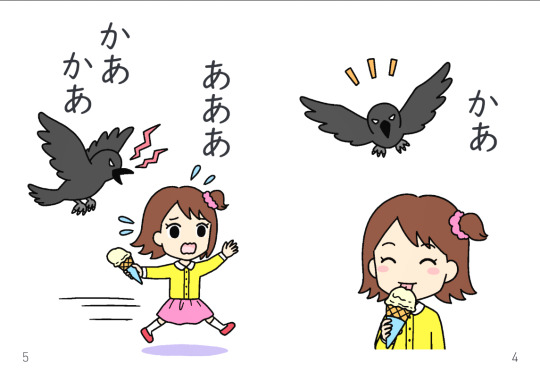
The free graded reader 「どうぞ、どうも」 by the NPO Tagengo Tadoku only uses the words 「どうぞ」 and 「どうも」 to write an entire story. Again, this makes for a great exercise in reading hiragana and understanding context. Another "level 0" recommendation by the same NPO would definitely be 「しろい?くろい?」. This book uses the full range of hiragana characters but the grammar is simple and all used vocabulary is illustrated.
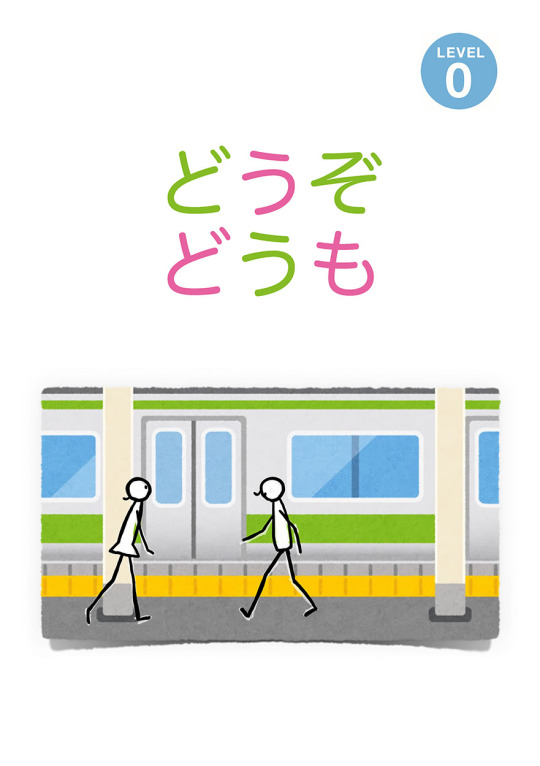
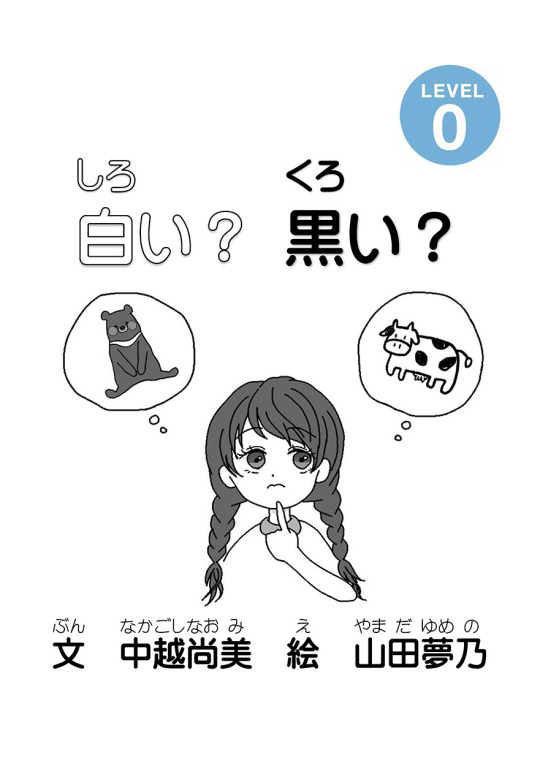
Another site with great resources for absolute beginners is Nihongo Tadoku Dōjō. If you have memorized both hiragana and katakana and know how the particles を and で work you will be able to read this text about stationary (ぶんぼうぐ) and understand everything by looking at the pictures!
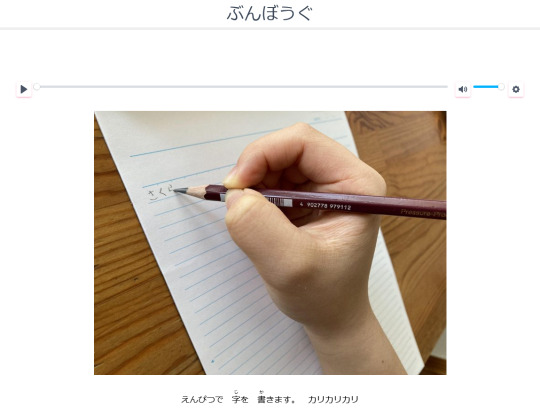
The resources linked so far can all be accessed completely free on the linked websites. If you have the money to spare, please also have a look at the box 「スタート」 from the series reberubetsu nihongo tadoku raiburarī published by the NPO Tagengo Tadoku and ASK (affiliate link). This box includes 8 little books in very simple Japanese.

All these texts for absolute beginners will get you started reading in Japanese with very little knowledge of characters and vocabulary.
Reading in Japanese is a skill that requires practice. But once you get used to it, it can be such a valuable tool to reinforce new vocabulary and grammar. So please don't wait until you're "ready" before you start reading - start early at your own level!
650 notes
·
View notes
Text
いろどり · irodori - Japanese for life in Japan
(。•̀ᴗ-)✧ resources

IRODORI is a useful website made by The Japan Foundation. It is a series of 3 textbooks, with audios and materials completely free, focusing on developing skills useful for life in Japan.
Whether you are planning to come to Japan in the future and want to learn what you should be able to do before you arrive, or whether you are already living in Japan and wish to check your Japanese ability and increase the number of things you can do, we sincerely hope that this textbook will help you achieve your goals. - "what is irodori" website page.
The textbooks are super organized, divided in: starter (A1), elementary 1 and elementary 2. Finishing elementary 2 means having an A2 level [At A2 level, you can hold short, basic everyday conversations on familiar topics.]
I recommend styling your learning method with the goal you have in mind. You can understand more about it reading the post I made.
Hope it was helpful! Let me know and let's share resources~
またね~@inkichan
꒰ა ˚₊ ✧・┈・╴﹕꒰ ᐢ。- ༝ -。ᐢ ꒱﹕╴・┈・𐑺 ‧₊˚໒꒱
574 notes
·
View notes
Photo
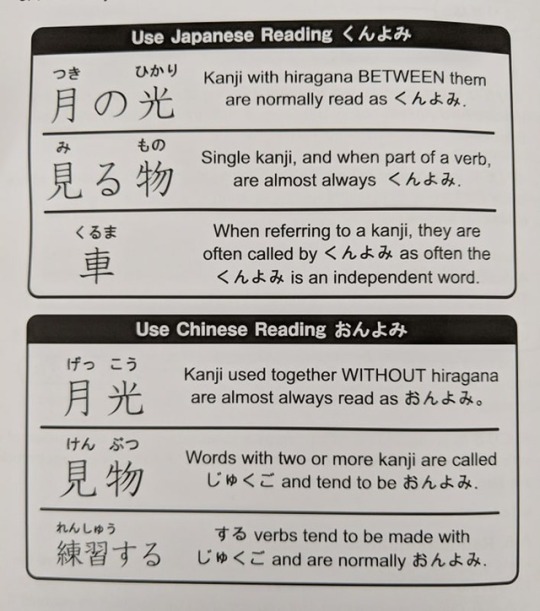
For all those times you ask yourself, “Onyomi or Kunyomi??”
8K notes
·
View notes
Text
「ごあいさつ」と「プローログ」
I finally got around to reading 外国語をつかって働きたい!and just from reading the author’s introduction alone, I learned a lot of new vocabulary/kanji

脱「だつ」サラ:setting oneself free from white collar work
職歴 「しょくれき」:work experience/history
脈絡 「みゃくらく」:logical connection, chain of reasoning
美大 「びだい」:art college
受験 「じゅけん」:taking an exam
食「く」いっぱぐれ:missing a meal
判断 「はんだん」:judgement
校正 「こうせい」:proofreading
未練 「みれん」:lingering attachment
むくむくと:rising up, billowing
蘇「よみがえ」り:resurrection, revival
今更 「いまさら」:now (after a long time)
微妙 「びみょう」:subtle, delicate, tricky
調子 「ちょうし」:tune, tone, mood, way
326 notes
·
View notes
Text
Websites for Japanese Learners
! click on website name to be redirected !
all websites can be used for free and without subscribtion (thats why japanese101 isnt included)
-> apps for japanese learners (soon)

1. JLPT Sensei
study guides (N5-N1)
includes grammar, kanji, vocabular, adjective, verb and other lists for orientation when studying
free JLPT practice tests
2. Japanese Verb Conjugator
automatic verb conjugator
verb database
kanji database & kanji tester
over 180,000 example sentences with sound
3. Tanoshii Japanese
japanese-english dictionary (with stroke order!)
pratice games & interactive lessons (Kanji Mahjong etc.)
learning resources (japanese novel, textbook, magazine, movie recommendations)
4. Jisho
fast and smart japanese-english dictionary
draw and radical function apart from keyboard search
searching by topic and categories by adding #[topic/category]
JLPT levels, sentences, particles, counters, names included
5. Map Quiz
world map quiz in japanese
divided into continents and north, east, south and west
6. Japanesetests4you
free JLPT N5-N1 reading and listening tests
free JLPT N5-N1 vocabulary, kanji and grammar lists + tests
7. Shiritori Online
Shiritori (しりとり) is a popular japanese word game and is ideal to exercise vocabulary for japanese learners. 2 or more players take turns saying a word that starts with the last kana of the previous word. The game ends when someone answers with a word ending with -n (ん) because there are no words starting with ん.
it is up to the players whether all forms of a hiragana (kana and its diacritics; は,ば and ぱ etc.) are allowed or not (e.g やぎ -> きよう).
example: りんご (apple) -> ごりら (ゴリラ) (gorilla) -> らーめん (ラーメン) (ramen). The last person who said ramen loses because the word ends with -n (ん). Instead the person could have saidらま (ラマ) (llama) (e.g).
2K notes
·
View notes
Text
段々(だんだん) - Gradually, Little by little, Step by step
Can be thought of as meaning ‘step by step’, ‘stepwise’, or even ‘steadily’. だんだん is similar to ほとんど, in that it can modify the meaning of entire phrases, rather than just single words.
だんだん + (と) + Phrase
To use だんだん, simply put it before the phrase that you want to express as ‘(A) that is increasing steadily’.
*While だんだん can take the particle と, it is not required. In fact, と is very often omitted from adverbs/onomatopoeic words (words that represent a sound or motion) in Japanese.
*Don't mix it up with どんどん, which is essentially the antonym of だんだん. どんどん is an onomatopoeic word that represents loud banging (like on a drum), and is used to express fast changes/progression.
だんだん雨が降ってきた。It is starting to rain. (Slow progression, does not imply great speed or severity)
どんどん雨が降ってきた。It is starting to rain. (Rapid progression, may imply great speed and/or severity)
友達が話している:「だんだんとあのやつの事が嫌いになってきていて、今は避けるようにしている。」 Chat between friends: "I gradually came to dislike that guy, and now I do my best to avoid him."
近所の人が話している:「来週からだんだん暖かくなるってニュースで言っていましたよ。」 Neighbors talking: "The news said that it will gradually get warmer from next week."
228 notes
·
View notes
Text
Recommendation: Apps for Japanese Learning

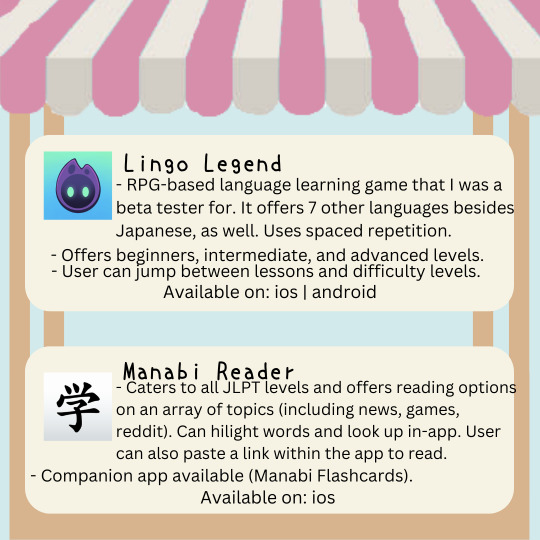
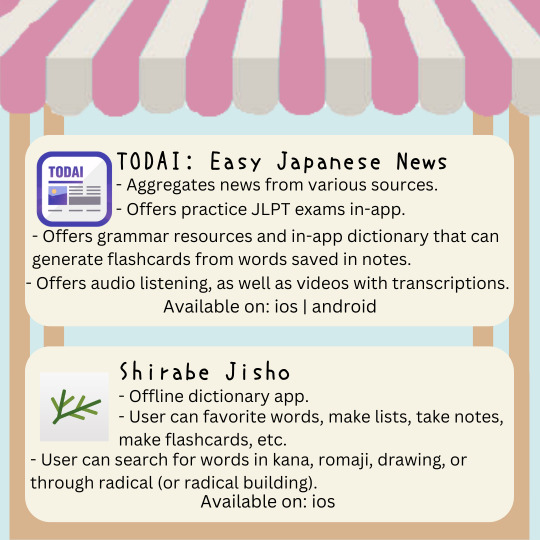

Over the years, I've downloaded and tested many apps. Though my favorite app was discontinued (I miss you, mindsnacks Japanese), there are still others that I don't think I'll be removing from my phone any time soon. In light of duolingo's horrible update causing a large migration and search for other apps, I thought I'd share some of my favorites. Also, some of these apps have websites or discords for you to interact with other users or to ask support questions.
For those who cannot use/don't like the graphics, the written out version is below the break.
Lingo Legend
RPG-based language learning game that I was a beta tester for. It also offers Spanish, French, Japanese, Korean, Mandarin Chinese, German, Italian, and Portuguese. Uses spaced repetition.
Offers beginners, intermediate, and advanced levels.
User can jump between lessons and difficulty levels.
Available on ios and android
Manabi Reader
Caters to all JLPT levels and offers reading options on an array of topics (including news, games, reddit). Can hilight words and look up in-app. User can also paste a link within the app to read.
Companion app available (Manabi Flashcards).
Available on ios
TODAI: EASY Japanese News
Aggregates news from various sources.
Offers practice JLPT exams in-app.
Offers grammar resources and in-app dictionary that can generate flashcards from words saved in notes.
Offers audio listening, as well as videos with transcriptions.
Available on ios and android. Also has a website.
Shirabe Jisho
Offline dictionary app.
User can favorite words, make lists, take notes, make flashcards, etc.
User can search for words in kana, romaji, drawing, or through radical (or radical building).
Available on ios
Renshuu
Think quizlet, but solely for Japanese. You can create your own lists, use others, play shiritori, earn prizes and interact on forums.
You can study grammar, kanji, vocab, flashcards, learn and submit mnemonics. You can also friend people.
Available on ios and android. Also has a website (of which I am an avid user).
Connect with me: Ko-fi Shop & Tips | Discord | Studygram | Ask Box
↳ psst! my ko-fi shop has learning resources on it. try to check back for new things bc im always working on something to add in there
1K notes
·
View notes
Text
【語彙】フリマアプリ等
In the past year or so, I've sunk quite a lot of money in Japanese second hand goods. It's been quite a pleasant experience to browse through many well described offers where most of the time you get exactly what you want, in great condition and for cheap price.
Without further ado, I've compiled a list of useful vocabulary that one may encounter while shopping on Japanese online marketplaces or フリマアプリ.
General condition:
新品 - new item
中古品 - used item
未使用 - unused
未開封 - unopened, sealed
未視聴 - not played (CD, DVD)
開封済 - opened, unsealed
美品 - in mint condition
使用感 - visible signs of use
人の手に渡った - bought from someone else (ie. the person selling is not the first owner of the item)
帯付き - includes obi
特典付き - includes bonuses
Damages:
傷 or 痛み - general imperfections
汚れ - dirt, stains
染み or シミ - stain
皺 or シワ - wrinkle
擦れ or スレ - scratch
日焼け - sun discolouring
書き込み - writing, notes (in a book etc.)
Seller terms:
プロフィール必読 - please read my profile before purchase
即購入 or 即買い - immediate purchase (ie. without contacting the seller first)
値下げ交渉 - price negotiation
バラ売り - selling separately
まとめ売り - selling together
自宅保存 - stored at home
素人保存 - stored by an inexperienced person
確認済み - checked (f.ex. if the CD is playing well)
Phrases you may see in listings:
神経質な方はご遠慮ください。Please refrain from buying if you are sensitive to the item's condition.
読めればいいという方向け。Oriented at people who only care about reading the item (and don't mind the condition).
PCに取り込んで自宅保管しておりました。After ripping (the CD) it was stored at home.
暗所に保存しておりました。It was stored in a dark place.
再生に問題はありません。No problems with playing (CD, DVD).
ペット、喫煙者ございません。No pets or smokers in the household.
ご了承ください。Please accept it (the item, seller's terms etc.) as it is.
349 notes
·
View notes